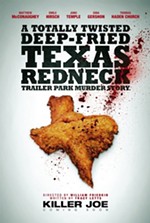Rampage
1992 Directed by William Friedkin. Starring Michael Biehn, Alex Mcarthur, Nicholas Campbell, Deborah Van Valkenburgh, John Harkins, Art La Fleur, Grace Zabriskie.
REVIEWED By Marjorie Baumgarten, Fri., Nov. 27, 1992
If Dirty Harry were a real person who lived and breathed and went to the movies, Rampage might be his cup of poison. Yet odds are, he'd regard Rampage's hero, Anthony Fraser (Biehn), a wimp. Fraser is a young district attorney who, at the beginning of the film, is opposed to the death penalty but after coming face to face with a crime so heinous and unrepentant, he sees the wisdom and efficacy of capital punishment. At that point the only difference between Fraser and Dirty Harry is that Fraser still believes in the legal system and Dirty Harry knows that justice is an academic concept unsuited for street survival. Rampage was filmed by William Friedkin, whom we still remember as a startling newcomer (The French Connection, The Exorcist) even though his recent career has been marked by a notable detumescence (Cruising, To Live and Die in L.A., The Guardian). Still, Rampage employs Friedkin's plentiful knowledge of the gritty business of police work and criminal activity. The movie is shot in a raw, TV docudrama-like street style with abrupt and constricted camera movement and shifting points of view. The point of view that's missing, however, is that of the rampaging murderer, a fascist-loving killer who shoots his victims, rapes the women, disembowels their organs and drinks their blood. (McArthur plays this creep to chilling perfection.) To the film's credit, these facts are conveyed with a remarkable of degree of restraint though the fact that you actually see very little of this shocking mayhem doesn't make you feel any less sullied and violated for the mere idea of these crimes having penetrated your consciousness. The movie turns us all into victims and Friedkin makes this point most demonstrably during a courtroom sequence in which he points out to the jurors that it took each of the victims three minutes to die. At that point the movie falls silent so we can all excruciate together. Fraser's goal is to prove that the defendant is legally sane and therefore, responsible for his crimes. If found sane, then he can be held culpable for his heinous acts and sentenced to death. There will be no chance for parole, repeat occurrences or exoneration, and somehow, the world will become a better place because of this. Through the course of this trial, Fraser has come to accept the belief that the lives of innocent citizens are intrinsically worth more than the lives of homicidal murderers. The villains in this story are the psychiatric cabal that protects their own kind with a shield of neurological folderol (highlighted by the weird, palpitating Ennio Morricone music that accompanies every brain scan scene) and coddles the prisoners with insanity defenses. Psychiatrists are the real enemies according to Rampage. While the movie is often a sensitive enunciation of victims' rights and a showcase for their needs, it is also a muddled narrative that ultimately is more absorbed in crusade than in sensible storytelling.
A note to readers: Bold and uncensored, The Austin Chronicle has been Austin’s independent news source for over 40 years, expressing the community’s political and environmental concerns and supporting its active cultural scene. Now more than ever, we need your support to continue supplying Austin with independent, free press. If real news is important to you, please consider making a donation of $5, $10 or whatever you can afford, to help keep our journalism on stands.
Marjorie Baumgarten, Aug. 3, 2012
Marjorie Baumgarten, Aug. 2, 2012
Marc Savlov, Aug. 3, 2012
Steve Davis, June 1, 2007
Rampage, William Friedkin, Michael Biehn, Alex Mcarthur, Nicholas Campbell, Deborah Van Valkenburgh, John Harkins, Art La Fleur, Grace Zabriskie











